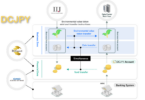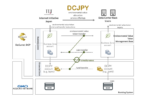Indian power distribution provider Tata Power-DDL and Australian blockchain company Power Ledger will initiate a peer-to-peer (P2P) solar energy trading pilot in Delhi where the power company serves seven million customers. The initiative is in collaboration with India Smart Grid Forum (ISGF) and will be the first of its kind in the Indian capital.
One issue encountered when shifting away from fossil fuels towards renewable energy sources is an imbalance between the supply and demand of energy. India is rapidly shifting towards renewable energy sources, of which 100GW will come from solar energy. Of those, 40% are predicted to be generated through rooftop panels, where the supply is weather dependent and the residential demand is very irregular from day to day. As such, it is essential to establish a sustainable system to address imbalances of supply and demand of energy in households and commercial buildings.
P2P platforms help by facilitating the trade of renewable energy between consumers and prosumers. In this pilot, the prosumers are Tata Power-DDL customers who own solar panels. But to really balance demand and supply, it helps to store excess energy. Hence Battery Energy Storage Systems will be integrated via the grid as well as electric vehicle (EV) charging systems.
A total of 150 sites will be participating in the project selling excess energy to other households and businesses through Power Ledger’s platform.
The trial will operate until June of this year and test several trading strategies and algorithms, including the trial of dynamic trading, where prosumers auction energy to consumers. In addition, the results will aid in providing recommendations for regulations around solar P2P trading.
“India is about to delicense power distribution business and make open access to retail customers enabling them to buy electricity from anybody from anywhere,” said ISGF President Reji Kumar Pillai. “In that scenario, a blockchain platform for P2P trading of electricity will be a perfect game changer for the clean energy revolution in the country.”
The pilot is part of the International Solar Alliance and the National Strategy on Blockchain. The former is an alliance initiated by India between 121 countries aiming to work towards sustainable and efficient solar energy consumption. The latter is an initiative promoted by India’s government to encourage the development and implementation of blockchain solutions in India’s power sector.
Meanwhile, this isn’t Power Ledger’s first Indian initiative. It conducted another trial in Delhi with BSES Rajdhani Power. Plus, it’s involved in over 25 projects related to energy trading on blockchain across ten different countries. Last year, the company signed a three-year deal with a Perth-based property developer to install energy trading platforms in some of its residential projects.
In addition, Power Ledger has a partnership with Thailand’s Digital Energy Development to develop the country’s trading infrastructure for renewable energy. The company is also collaborating with BCPG to create a renewable energy credit marketplace in the Southeast Asia region and has a deal with American electricity provider American PowerNet.






